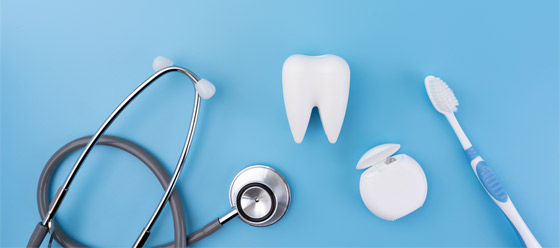 Dr. Derek Chenet achieved his Doctor of Dental Surgery at the Columbia University College of Dental and now works alongside his father and fiancée, Dr. Veronica Yu, at Dental Excellence Melbourne.
Dr. Derek Chenet achieved his Doctor of Dental Surgery at the Columbia University College of Dental and now works alongside his father and fiancée, Dr. Veronica Yu, at Dental Excellence Melbourne.
It is a routine question dentists ask patients. We document these changes, get a medical clearance if necessary and treat the teeth. Not very interdisciplinary. How many times have you been at your doctor’s and he has asked,
“Any changes to your dental history?”
I am betting not many. This is a shame, because both the medical and dental fields would benefit from improved collaboration between our siloed health industries. This collaboration is important because there are links between the mouth and systemic issues, opportunities where dentists can serve as a first line of defense in catching medical issues early, and ways dentists can benefit patients with long-standing medical issues to improve their overall health.
There is growing evidence of a link between systemic health of the body and our oral health.
Periodontitis, or gum disease, is a condition we deal with daily in dental practice, but it may have a greater significance than most think. Periodontitis is more common in patients with diabetes due to an increased tendency for inflammation and poor healing. It has been shown treating gum disease can actually improve a patient’s level of diabetic control. Furthermore, periodontal disease has also been shown to be correlated with an increased risk for heart disease and strokes. Periodontitis has even been shown to be correlated with low birth weight in infants when left untreated in expectant mothers. These are just a few of the links between systemic and oral health.
Dentists can serve as a referral source to help discover certain conditions early. Head and neck exams and oral cancer screenings are a routine part of dental treatment. Dentists are some of the first people who can find the odd mole, palpate nodules on the neck, or notice a white spot on the tongue that are signs of something not so benign. Some of the first evidence of conditions like gastric reflux, GERD and obstructive sleep apnea are seen in the oral cavity through erosion of our teeth surfaces or evidence of grinding. Finding potential signs of conditions early and referral to the appropriate physician for further evaluation and treatment can make a huge difference in patients’ lives.
There are ways dentists can help physicians optimize their patient care. In certain parts of the country, gastroenterologists are called in to hospitals to see patients with impactions of under-chewed food, swallowed whole, stuck in their esophagus. Patients with a long history of sleep apnea and GERD have seen their teeth erode and grind away over the years. Xerostomia, or dry mouth, is a common side effect of many medications, and patients everywhere are suffering with recurrent cavities and decay. Through dental treatment, like replacement of missing teeth or restoration of broken or decayed teeth, dentists can help physicians improve the overall health and wellbeing of their patients.











